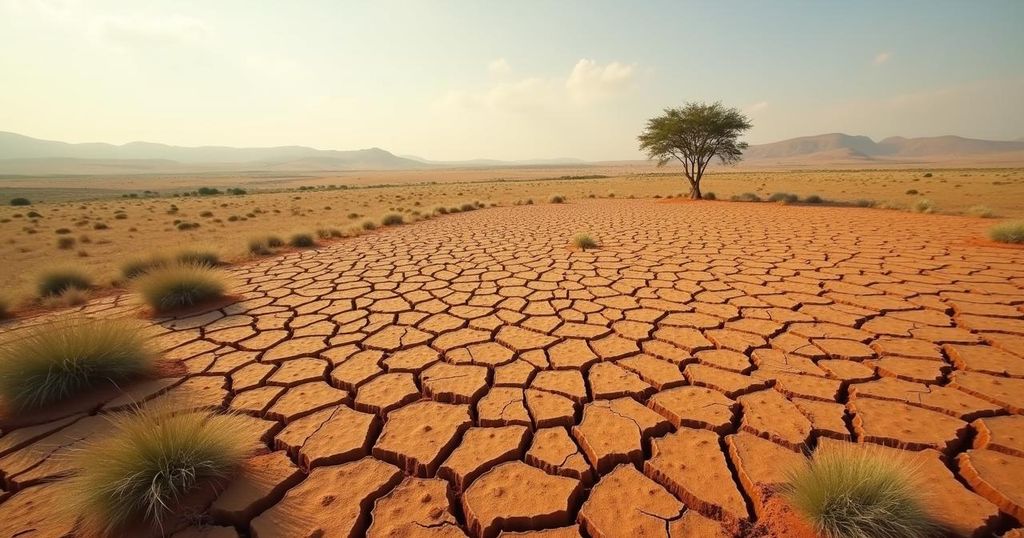The 2023/2024 El Niño event has triggered the worst drought in 40 years in Southern Africa, leading to severe food shortages, water scarcity, and health crises affecting approximately 23 million people. With national drought disasters declared in multiple countries, urgent humanitarian assistance is required for millions, particularly vulnerable populations such as children suffering from malnutrition.
The 2023/2024 El Niño phenomenon has resulted in severe drought conditions across Southern Africa, marked by delayed rainfall, prolonged dry spells, and extreme heat. This El Niño event is noted as the most severe in 40 years, adversely affecting populations already contending with agricultural failures and precarious economic conditions. The resultant drought has led to significant food shortages, insufficient access to clean drinking water, the outbreak of diseases, and the loss of livestock. As reported by national governments and FEWS NET assessments, maize yields in the region are expected to fall well below the average established over the past five years. With mere months remaining until the next harvest in April 2025, affected communities have used up their already minimal food resources. Approximately 23 million individuals are experiencing heightened food insecurity, with Malawi, Zambia, Zimbabwe, and Mozambique being the most affected. Estimates suggest that between 14.0 and 14.9 million individuals will urgently require humanitarian assistance during the lean period from October to December 2024. Currently, Botswana, Lesotho, Malawi, Namibia, Zambia, and Zimbabwe have officially declared national drought disasters. Angola and Mozambique are also severely impacted, with about 1.8 million people in Angola and 3.3 million in Mozambique lacking adequate food supplies. In addition to food insecurity, it is projected that over 2 million children will suffer from acute malnutrition in 2024, with more than 500,000 facing severe forms of malnutrition. The extreme weather conditions have displaced thousands of individuals, caused numerous disease outbreaks, exacerbated food scarcity, and significantly affected agricultural productivity. These drought conditions arise in a context already vulnerable to various epidemics and medical crises, such as cholera and measles, with the possible emergence of mpox threatening to divert resources from drought response efforts in some nations. Coinciding with one of the worst cholera outbreaks the region has experienced in decades, the drought conditions pose additional risks; despite a relative stabilization of the cholera situation, persistent water shortages are compromising sanitation and hygiene initiatives. This situation is particularly precarious in Malawi and Mozambique. Moreover, the challenges presented by the drought have the potential to elevate the risks of HIV and AIDS transmission, exacerbate mental health issues, and increase instances of gender-based violence, highlighting the urgent need for robust preparedness and response strategies. The compounding effects of El Niño alongside cholera outbreaks, conflicts, and climate change have strained health systems throughout Southern Africa, severely limiting access to crucial sexual and reproductive health services. Over one million individuals have been displaced internally due to disasters and climate change, mainly from Malawi, Mozambique, and Zimbabwe.
Southern Africa is currently facing a grave humanitarian crisis caused by the effects of the 2023/2024 El Niño event—a climate pattern associated with wide-ranging weather volatility. This specific El Niño has been recorded as the most severe in the past four decades, resulting in disastrous conditions such as extensive droughts leading to significant agricultural failures and food insecurity. The situation is further aggravated by pre-existing vulnerabilities, including ongoing epidemics, socio-economic struggles, and climatic changes affecting the region’s resilience, thus showcasing a multi-layered crisis affecting millions of people in several countries including Angola, Botswana, Lesotho, Malawi, Mozambique, Namibia, Zambia, and Zimbabwe.
In summary, the El Niño-induced drought has inflicted catastrophic impacts throughout Southern Africa, pushing millions into severe food insecurity and health crises. With high levels of malnutrition and significant health risks emerging, it is imperative that urgent humanitarian efforts are mobilized to address these needs. Enhanced preparedness and coordinated responses are essential to mitigate the effects of the drought, epidemics, and ongoing socio-economic challenges in the region.
Original Source: reliefweb.int







